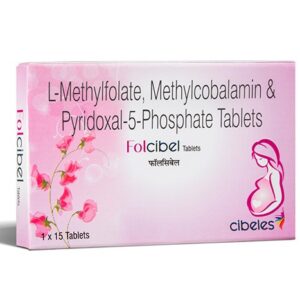METHYLCOBALAMIN + L-METHYLFOLATE + PYRIDOXAL-5-PHOSPATE
Methylcobalamin: Methylcobalamin is a form of vitamin B12 and is an essential nutrient for the normal functioning of the brain, nerves, and blood cells. It is commonly used in the treatment of vitamin B12 deficiency and related conditions.
The mechanism of action of methylcobalamin is to act as a coenzyme in various metabolic pathways, including the synthesis of DNA, fatty acids, and myelin. It is also involved in the production of methionine, which is important for the formation of red blood cells.
Methylcobalamin is available in various forms, including oral tablets, sublingual tablets, injections, and as a nasal spray. The appropriate dose of methylcobalamin depends on the individual’s age, weight, and medical condition. It is usually recommended to start with a low dose and gradually increase if necessary. The usual recommended dose of oral methylcobalamin for adults is typically 1000 to 2500 micrograms per day.
Overall, methylcobalamin is considered safe and well-tolerated when used as directed. However, like any medication, it can cause side effects in some individuals. Common side effects may include headache, nausea, vomiting, diarrhea, and skin rash. In rare cases, it may cause an allergic reaction, with symptoms such as itching, swelling, and difficulty breathing. If any severe or persistent side effects occur, it is important to seek medical attention. Additionally, individuals with certain medical conditions, such as Leber’s disease or kidney disease, should use methylcobalamin with caution and under medical supervision.
L-Methylfolate: L-Methylfolate, also known as Levomefolic acid, is a medical food supplement that is used to treat certain types of folate deficiency. It is mainly prescribed in cases where the body has trouble converting folic acid into its active form, known as L-Methylfolate. This medication is available in tablet form and is taken orally.
L-Methylfolate plays a crucial role in the body’s methylation process, which is responsible for various important functions such as DNA synthesis, neurotransmitter synthesis, and regulation of gene expression. By providing the active form of folate, L-Methylfolate helps to support these essential processes.
The recommended dose of L-Methylfolate varies depending on the specific deficiency being treated and the individual’s overall health. It is typically prescribed and monitored by a healthcare professional. Common doses range from 7.5 mg to 15 mg per day.
While L-Methylfolate is generally considered safe, there can be some side effects associated with its use. These side effects are usually mild and may include nausea, stomach upset, sleep disturbances, irritability, and headache. If any severe side effects or allergic reactions occur, it is important to seek medical attention immediately.
It is important to note that L-Methylfolate is not intended to be used as a substitute for a healthy diet or as a standalone treatment for all types of folate deficiency. It should be used under the guidance and supervision of a healthcare professional, who will determine the appropriate dose and duration of treatment based on individual needs.
Pyridoxal-5-Phospate: Pyridoxal-5-phosphate (PLP) is the active form of vitamin B6 and is used as a supplement or medication. It is commonly prescribed to treat various conditions related to vitamin B6 deficiency, such as certain types of anemia, seizures, and peripheral neuropathy.
The primary mechanism of action of PLP is its role as a cofactor in many enzymatic reactions in the body. It plays a crucial role in the metabolism of proteins, carbohydrates, and fats, making it essential for numerous physiological processes. PLP is also involved in neurotransmitter synthesis, immune function, and the regulation of homocysteine levels.
The recommended dose of PLP depends on the condition being treated. For vitamin B6 deficiency, the typical adult dose ranges from 2.5-25 mg per day. In the case of seizures, the dose may be increased to 100-600 mg per day, under medical supervision.
PLP is generally considered safe when taken within the recommended dosage range. However, like any medication, it can have side effects. Common side effects of PLP supplementation may include nausea, vomiting, stomach pain, diarrhea, headache, and drowsiness. These side effects are usually mild and resolve on their own. In rare cases, allergic reactions may occur, presenting as rash, itching, swelling, or difficulty breathing. If any of these severe side effects occur, immediate medical attention should be sought.
It is important to note that while PLP can be helpful in treating certain conditions, it should be used under the guidance of a healthcare professional. They can evaluate the appropriateness of PLP supplementation, determine the correct dosage, and monitor for any potential interactions or adverse effects.

